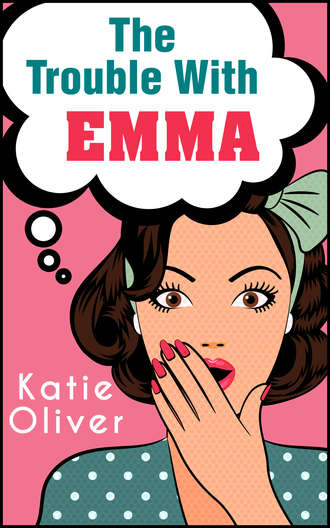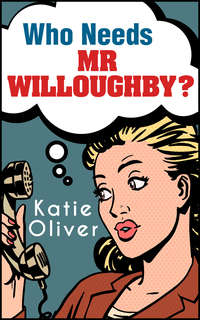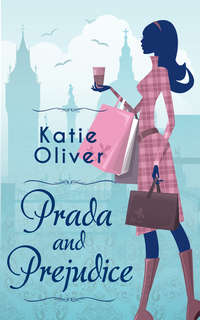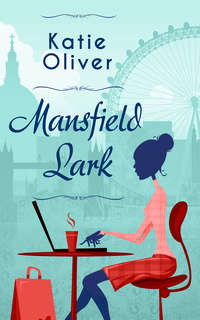
Полная версия
The Trouble With Emma
He put his tray of olive savoury tarts aside and wiped his hands on a cloth. “No problem.” He went to a safe in the corner and withdrew a zippered bank bag. He counted out five, ten, and twenty pound notes into her hand. “There you are. Put the note under the till drawer, I’ll settle it up later when we cash out.”
“Thanks.”
When she returned, her customer was just sliding his phone back into his pocket. “Here we are,” she announced, and handed him his change. “Can I get you anything else?”
“Not a thing.” He thrust the wad of notes in his wallet and returned it to his back pocket. “Thank you. You’ve been most helpful.”
With a gallant bow and another smile, he picked up his box, made his way to the door, and clanged out of the shop.
Chapter 10
When it was time to cash the till out at two-thirty, Emma came up twenty pounds short.
“Oh, no,” she exclaimed, and looked at Boz in dismay. “Perhaps I made a mistake.”
But after he counted out the cash against the day’s receipts a second time, the result was the same – they were exactly twenty pounds short.
“You either gave someone too much change,” Boz said, and shrugged, “or two bills stuck together. No matter – it happens sometimes.”
“Of course you’ll take it out of my pay,” Emma told him firmly. “It’s my fault, after all.”
“No. It’s an honest mistake, Em, and one we’ve all made at one time or another.” Boz shut the cash drawer. “Just be careful in the future when you make change, and make sure the new notes don’t stick together.”
“I will do, I promise.” Guiltily, Emma remembered her distraction while waiting on the man in the bespoke suit. She’d forgotten to mention the coconut-toasted doughnuts, had barely been able to string a sentence together, and in the face of his engaging personality had quite lost the thread of what she was doing. “I’m so sorry.”
“Don’t worry about it, love.” He smiled. “Help me and Viv clean up the kitchen, and then you’re free to go. And grab a couple of cream horns for your dad on the way out.”
***
“So, tell me – how was your first day at the bakery?” Mr Bennet asked an hour later as he and Emma shared a cup of tea and cream horns at the kitchen table.
“Fine, until it was time to cash out.”
She told him about coming up twenty pounds short. “The notes Boz gave me were new,” she finished morosely, “and two of the twenties must’ve stuck together when I gave my customer his change.”
Mr Bennet nodded. “Perhaps he’ll notice, and come back?”
“I doubt it. Not that I think he’d deliberately keep the money – he certainly didn’t seem to need it,” Emma added. “But he didn’t even glance at the notes before he put them away in his wallet.”
“File it away under ‘lessons learned’, and be more careful in future,” her father advised. “Perhaps,” he added thoughtfully as he picked up his pastry, “I’ll bake Boz some scones to show my appreciation.”
“Daddy, he bakes dozens of scones every day.”
“Oh. Yes.” He looked deflated. “No use carrying coals to Newcastle, I suppose.”
She leaned forward and laid her hand on his. “Why don’t you make some for us? And we’ll need a couple of dozen more for Lizzy’s party, too.”
“Right you are.” He set his cup down with a purposeful click. “Of course everyone will want scones.” He reached out for the pad of paper and pencil by the sugar bowl and drew it forward. “Hmmm…what do you think, Emma? A dozen savoury, and a dozen sweet?”
***
Martine arrived at Litchfield Manor at eight o’clock the following morning, just as Emma attached the lead to Elton’s collar to take him for a walk.
“Off for a stroll outside with Miss Em, are you, Mr E?” the girl asked, and set her purse aside to kneel down to pet and coo over the dog.
“It’s stopped raining and the sun’s out,” Emma said. “We’re taking advantage of it while it lasts.”
She eyed Martine’s leggings and faded Rolling Stones T-shirt with a barely concealed shudder and reminded herself to start on her makeover, and soon. The girl was in desperate need of an intervention.
“Mum says she’ll make the curtains for you,” Martine said as she straightened and turned to Emma. “But she won’t hear of you payin’ her for it.”
“I won’t hear of not paying her,” Emma said firmly. “We’ll talk about it when I get back. Oh,” she added as she opened the back door, “I have a few things for you to try on before you go.”
“For me?” Martine looked doubtful. “I don’t know –”
“It shouldn’t take long.” Emma’s words were brisk. “I have the most adorable trackies – bright pink, if you can imagine!” She grimaced. “They don’t suit me in the least, but I think they’ll look very well on you.” She eyed the girl’s leggings, faded from black to grey after numerous washings. “A proper tracksuit is always a good thing to have.”
“If you say so,” Martine sighed. “I’ll be here.”
“You don’t sound very enthusiastic,” Emma observed with a frown. “If you don’t really want them…”
“Of course I do!” the girl assured her. “Don’t be silly.” She managed a convincing smile. “After all, I owe you, Miss Em, more than I could ever repay,” she added earnestly. “You saved my life after dad died. I’ll never forget it. I don’t know what I’d of done without you.”
Emma returned her smile. “I only did what anyone would’ve.” Her smile faded. “Losing a parent is hard, the hardest thing in the world. I know that only too well.”
Martine nodded and swallowed back the lump that rose in her throat. “I know you do. We all miss your mum.”
“Thanks. And we all miss Mr Davies. Right,” Emma said briskly, “I’d best get a move on. I’ll see you back here in –” she consulted her wristwatch. “An hour.”
Emma and Elton set out on their walk and headed down the road to Litchfield. Hedgerows crowded in on either side of them, leaves still glistening with water, and the ground was soggy beneath their feet. But the sun was shining and the rain had stopped, and that was enough.
Litchfield teemed with the usual mix of tourists and locals as she and Elton made their way down the high street. She paused to let the dog take a wee. Although Emma saw a couple of neighbours and lifted her hand to wave, there was thankfully no sign of Mrs Cusack or her clever, hat-designing niece.
You’re not being fair, she scolded herself. You don’t even know Isabella. You’re just – admit it! – a tiny bit jealous. Still – there was something about the girl, a vague air of secretiveness that struck her straight away.
Isabella Fairfax was keeping something back, she was sure of it.
Elton finished his wee, and they resumed their walk. The shop windows boasted ‘end-of-season SALE’ and ‘half off!’ signs as the swimsuits and beach totes, the cheap plastic sunglasses and flip-flops were cleared out to make way for the autumn inventory. It wouldn’t be long before the first chill invaded the air and leaves rimed with frost crunched beneath their feet.
But for now, the sun was warm and the sky was blue and cloudless – it was a perfect late-summer day by the sea.
Almost as if she were drawn to it, Emma found herself once again standing at the far end of Mulberry Street, gazing up at Crossley Hall. The workmen were already up there; she could hear the sound of band saws and nail guns, hammering, and the faint strains of Radio 1 coming from someone’s portable Roberts.
“What do you say we go up and have a closer look, Mr E?” Emma asked, and glanced down at the pug. He wagged his curly tail enthusiastically in answer.
She set off with the dog up the hill, until, a short time later, they arrived in front of the Hall. The gates were firmly shut. Emma peered through and gazed up at the house, curious to see more; but the tall windows looked down on her, revealing nothing of their secrets, and the shrubbery and hedges prevented her seeing anything of interest.
Her hand closed over one of the palings as she – gingerly – tried to push the gate open. But it didn’t budge.
“Oh, well, Elton,” she said, and turned away, “our curiosity will have to wait. It’s time we headed back home.”
But the dog planted his paws firmly on the pavement and refused to move. A low, menacing growl emanated from his throat and his eyes were fixed on something he saw on the other side of the gate. Every hair bristled.
Emma followed his gaze. “It’s only a squirrel, you silly boy. Come on.”
She tugged gently at the lead, but Elton didn’t budge. He wanted that squirrel.
“Come on, Mr E,” she said again, and tugged at his lead a bit more firmly. “You can’t go in there. Let’s go home.”
But he strained and barked as the squirrel darted across the drive and away through the grass, nearly yanking Emma’s arm from its socket as he lunged forward at the gate.
Suddenly, to Emma’s horror, the lead went slack. The dog got loose and, before she could stop him, wriggled his way through the gate and up the drive. In a flash he was gone.
“Elton!” she cried.
The lead’s a little wonky. Sometimes the clip comes loose.
That’s what Charli had said, Emma remembered, the day she’d brought the dog home to Litchfield Manor.
She gripped the iron palings of the gate now and shouted, “Hello? Is anyone there? My dog’s got through the gate! Can someone help me, please? Hello!”
But there was no answer. Of course there wouldn’t be, she realised with a sinking heart; the whine of saws and banging of hammers, and the drone of a tractor somewhere behind the house all served to drown her voice out.
Emma stepped back and eyed the hedgerows and ivy-choked stone wall that surrounded the property with misgivings. There was only one thing to do.
She walked along the length of the wall until she found a likely spot, ignoring the ‘NO TRESPASSING’ signs posted at regular intervals, and reached out to brush the ivy aside and gripped the rough stones for a foothold.
With a deep breath and a silent prayer that a pack of vicious guard dogs didn’t wait on the other side of the wall to tear her apart, Emma climbed up, balanced precariously on the top for a moment, then dropped down over the other side, and onto the grounds of Crossley Hall.
Chapter 11
The minute her feet hit the ground, Emma lost her balance and fell backwards, arms cartwheeling as she landed in a patch of mud and brambles. She got to her feet and looked at her scratched, mud-smeared legs and clothing in disgust.
“Bloody dog,” she muttered. “Bloody Charli!”
Although she longed to wipe the mud away, doing so would only make matters worse, so she gritted her teeth and turned round to survey the tangle of grass and shrubbery stretching away before her.
“Elton!” she shouted. “Elton, where are you?”
There was no sign of the pug. Not a rustle, not a crackling twig, nothing gave his location away. How, she thought darkly, could such a tiny dog be such a colossal pain in the arse?
Emma blundered forward for some minutes, muttering and cursing and calling out the dog’s name, until she paused for breath. Where in God’s name was he? He couldn’t have gone far. She must be in the garden, she realised, as the house was nowhere to be seen in this thicket of greenery.
“Mr Elton!” she snapped. “You little beast! Where are you?”
She forged ahead, and found herself on a path. Gravel crunched under her feet. The shrubbery had thinned somewhat, and she could make out flowerbeds on either side of the path. Bags of mulch were stacked under a greengage tree.
With a grunt, Emma ran straight into a wall. But as the wall reached out and gripped her by the shoulders, she realised she’d run smack into a person, not a wall. She blinked.
It was a man. The man from the bakery shop…
“You!” she said, her tone vaguely accusatory.
“Yes, me.” He regarded her in bemusement. “I’m not Mr Elton, obviously. Suppose I’m rather glad; it’s less than flattering, answering to ‘little beast’, isn’t it?”
Today he wore jeans, and a white knit polo shirt that did nothing to hide his nicely defined chest.
She looked down at her own muddy, scratched legs and back up at him. Embarrassment warmed her cheeks. “Elton is my dog,” she said. “My sister’s dog, that is. He got loose from his lead and squeezed in through the front gates, and I can’t seem to find him.”
“He’s probably with one of the workmen,” he remarked, “being fed quantities of Wotsits and beef jerky even as we speak.” He thrust out his hand. “James Churchill.”
“Emma Bennet.” She placed her hand in his and it was immediately swallowed up in his brief but firm grip.
“I remember you,” he added. “You sold me a dozen doughnuts yesterday,” he told her. “I understand they were quite good.”
She was surprised he remembered. “You understand –? Didn’t you try one for yourself?”
“No, I bought them for the crew.” He indicated several work vans, parked nearby and just visible through the foliage. “I should’ve got two dozen, though. Bloody hell but those men can eat.”
Emma managed a smile despite her discomfiture. “I won’t keep you, then. I need to find Elton before he wees on a priceless statue or something.”
He laughed. “Sorry, but I have no statues, priceless or otherwise, to be weed on.” He glanced at the tangle of tree limbs and hedges and sighed. “Just a lot of rubbish to be cleared off, inside and out.”
“Well, I’ll leave you to it and be on my way, Mr Churchill, just as soon as I find my dog.”
“James, please, and I’ll go with you,” he said, and motioned her to follow him. “I think I know just where he might be.”
Curious, Emma followed him down the path until the trees and brush thinned out around them and they arrived at a clearing. A lawn, green and recently mowed, stretched away behind the house. From their vantage point atop the hill, Longbourne Bay was visible.
“Oh, how lovely!” she exclaimed, and stepped forward to admire the view. “I’ve never been up here before. I’d no idea you could see the bay from this point.” She watched as a sailboat, white against blue, skimmed through the waves.
“From the top floor you can see Torquay as well. Come along inside,” he offered, “and I’ll give you a quick tour. Although I’ll warn you now, there’s not much to see at present but dust and drop cloths.”
“Thank you. I’d love a tour.”
She followed him across the lawn and up the terrace, and into the house itself. French doors opened into a large reception room, once beautiful with its carved plasterwork and coffered ceiling, thick now with sawdust and dirt and its floors covered with tarpaulin and buckets of paint.
“Excuse the mess,” he apologised as he led her through to the kitchen. “As you can see, we’re in the process of renovation. Ah.” He came to a stop, and Emma nearly ran into him. “Just as I thought – here’s your culprit, being lavishly spoilt by my housekeeper, Mrs Fenning.”
She peered around his shoulder. Elton had his head in a plastic bowl, crunching on dog kibble.
“With some leftover beef gravy ladled on top for good measure,” the housekeeper said, and smiled fondly down at the dog. “He yours, miss?”
Emma nodded. “He got loose from the lead and squirmed his way in through the gate. He’s led me on a merry chase.”
“He’s a cute little thing.”
“Do you mind terribly, Mrs Fenning,” Emma asked as she snapped the lead back on his collar, “if I leave him here for a few minutes longer? Mr Churchill –”
“James,” he insisted with a smile.
She blushed. “James,” she amended, “has offered to take me on a tour of the house.”
“Go right ahead, miss. I’ll just find another dish and get this little fellow some water,” she added, and turned away to begin searching the cupboards.
“I’m so sorry.” Emma trailed behind Mr Churchill as he took her through the library, drawing room, and study. “I’m sure you have other things to do.”
“Not really.” He paused at the bottom of the steps. “It’s no problem at all,” he assured her. “It’s nice to talk to someone besides a sweaty bloke with a clipboard in hand and his bum crack showing.”
She laughed and followed him upstairs.
Twenty minutes later, the tour was complete and they returned to the kitchen. Elton, his thirst and hunger sated, was ready to go as Emma led him back outside.
“Thank you so much, Mr – I mean, James,” she corrected herself, and smiled self-consciously. “You’ve been very patient and more than kind. The next dozen doughnuts are my treat.”
“Which reminds me.” He frowned and reached back to pull out his wallet. “This is yours, I believe.” He withdrew a crisp twenty-pound note and held it out between two fingers. “You overpaid me yesterday. I didn’t notice until last night. I intended to stop by the bakery today and return it, but now you’ve saved me the trouble.”
“Oh! Thank you, so much,” she said, and eyed him gratefully as she took the money. He was not only devastatingly handsome, but honest, as well. “Boz’ll be so pleased. I came up twenty pounds short when I cashed out yesterday.”
“Boz?”
“My boss,” she explained. “He owns Weston’s Bakery.”
“I hope he didn’t dock your pay.”
“No,” Emma agreed. “He was very understanding. It was my first day of work, so…” She shrugged sheepishly. “He was prepared to overlook it, just the once.”
“I’m very glad that he did.”
His eyes, she noted as she looked at him, were a lovely brown and crinkled attractively when he smiled.
“And I appreciate your honesty in returning the money. Thank you.” She paused. “I wonder…are you free on Sunday? We’re having a welcome home party for my sister Elizabeth. She’s just got married, to Hugh Darcy. I know it’s a bit last minute, so if you’re busy I completely understand –”
“Darcy?” He looked surprised. “I don’t know him personally, but I certainly know of him. Rich as Croesus, isn’t he?”
“Richer.” She laughed. “We’d love you to join us. I can introduce you to some of your new neighbours.”
He bowed. “It would be my very great pleasure to come. Any excuse to see you again is welcome. What time shall I be there? And…where shall I be, exactly?”
“Sorry. Litchfield Manor, at noon. We’re just outside the village, next door to Cleremont.”
“Ah, yes, the former vicarage. I know just where it is. Charming old place.”
“Thank you. Well – it’s time I left,” Emma said. “It’s been lovely. I look forward to seeing you on Sunday.”
“I can’t wait. Oh – and by the way, no one has ever worn mud with quite so much élan as you, Miss Bennet,” he called after her.
“Thank you,” she said, and bestowed a dazzling smile on him before she turned to go. “I’ll take that as a compliment, Mr Churchill.”
Chapter 12
Clothing – dresses, scarves, trousers and shirts – covered Emma’s bed the next morning as she rooted through her closet. Martine sat perched on the bench in front of the dressing table with an anxious expression.
“You don’t ’ave to do this, Miss Em,” she said. “I’ve already got plenty of clothes thanks to you and your sisters.”
“But you don’t ever wear them.” Emma thrust her head out of the closet and regarded her quizzically. “Why is that?”
Martine picked up a tube of face cream and fiddled with it. “Because I wear regular clothes to work in, not dresses and twinsets, to be honest. And because most of the things you give me don’t fit properly,” she admitted. “I don’t mean to complain, truly; but you and Lizzy and Charli are skinny, tiny little things. I’m…fat.”
Emma regarded her in dismay. She hadn’t really thought about sizing; but Martine was at least a half a stone heavier than herself. Nevertheless, “You’re not fat,” she said firmly.
“I’m not skinny, neither.”
“You only need a bit of exercise…and so do I, come to that. I’ve an idea. Why don’t we start going for a run on the days you’re here?” she suggested.
“A run, miss?” Her expression was wary.
“Yes – a brisk twenty-minute jog down to the village and back. I’ll find you a pair of tracksuit bottoms to wear. You have trainers, don’t you?”
She nodded. “They’re a bit beat up, but they’ll do, I reckon.”
“Perfect.” Emma unearthed a pair of trackies with an elasticised waistband and handed them over. “We’ll start on Friday.”
“But…Lizzy’s party’s on Sunday,” Martine pointed out. “And there’s all them cakes and tarts and trifles to be made, and the house to be cleaned.”
Emma was forced to concede that the girl was right. “Well, then – we’ll start next week. And since my clothes won’t fit you, I’ll find some hats and scarves and show you how to accessorise your look.” She closed the closet doors and studied Martine with a thoughtful expression. “Right, let’s focus on your makeup in the meantime, shall we?”
“My makeup?” the girl echoed. She stared at her reflection, at her glossy lips and lashings of blusher, and admired the cat’s-eye flick she’d painstakingly copied from a recent issue of Bliss. “What’s wrong with my makeup?”
“Where to begin?” Emma murmured, and took a deep breath. “Let’s start,” she said as she came to stand behind Martine on the dressing table bench, “with your eye makeup. It’s fine for a party, but during the day you want to look more natural. As if you’re not wearing any makeup at all…”
With a sigh – and despite her misgivings – Martine leaned back and let Emma get on with it.
“Blimey, I wouldn’t let anyone else but you mess with my slap,” she grumbled, and closed her eyes as Emma began to wipe away all traces of her carefully applied cat’s-eye flick.
“You’ll love the results, I promise,” Emma assured her. “Just trust me.”
With another sigh, Martine muttered, “Right, I’ll try.”
“And please don’t frown,” Emma scolded. “I need to groom your brows a bit.”
“But I like my brows,” Martine protested, and her eyes flew open in alarm. “What’s wrong with ’em?”
“They look like caterpillars.” Emma reached for a pair of tweezers. “Now,” she ordered firmly, “I want you to sit back, relax, and close your eyes. This won’t hurt a bit.”
***
Twenty minutes later, Emma led Martine downstairs in search of Mr Bennet. They found him in the kitchen, a newspaper open on the table before him and a cup of tea at his elbow.
“Good morning, daddy,” Emma said.
“Good morning! Hello, Martine.” He glanced up at them with the briefest of smiles. “I didn’t realise you were here already.”
“Hello, Mr Bennet.”
“Distressing news in the paper this morning,” he said, and frowned down at the newspaper. “Our neighbour is selling his property to an investment group from London.”
Emma’s eyes widened. “Not Lord Darcy, surely –?”
“Oh, no. Sorry, I meant Sir Cavaliere. With no heir to be found and his health deteriorating, the old boy can’t keep the place up any longer and finds himself forced to sell and move into a care home.”
“What a shame! What will the investment group do with the property?”
“I don’t know. The article doesn’t say, as the transaction isn’t official yet.” His frown deepened. “I do hope they don’t pave it over and turn it into a water park. Or a shopping centre. To have something like that next to Litchfield Manor…” He shuddered.
“Well, there’s no use worrying about it if it hasn’t happened yet,” Emma reassured him. She drew Martine forward and eyed her father expectantly. “Do you notice anything different?”
“Different?” He set his cup down. “Erm…well,” he said after a moment, “I have to say, I don’t. Martine looks as…” he cleared his throat. “As lovely as ever.” With the smile of a man who’s just dodged a rather large bullet, he returned his attention to the paper.
“She’s had a makeover, daddy. Look at her face… Don’t you see a difference?”
“Oh. Oh – yes! Now you mention it, she does look, erm…fresh-scrubbed. Like a – a dairy maid from one of those eighteenth century pastoral paintings.”







